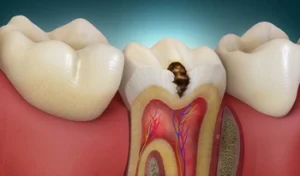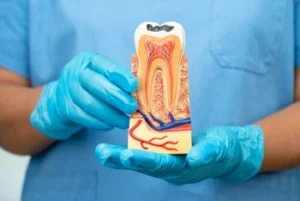A tooth that broke after root canal treatment but before a crown was placed is a situation that surprises many patients. You’ve gone through a root canal treatment to save your tooth, only to find it cracked or broken before the dental crown could be placed. It’s an unfortunate but not uncommon problem, and understanding why it happens can help prevent further issues.
This guide explains why a root canal-treated tooth can break, how to recognise early signs of damage, and what treatment options your dentist may recommend to restore your smile and protect your oral health.
Why a Tooth May Break After a Root Canal
After a root canal, the tooth structure becomes weaker than a normal natural tooth because the infected pulp and nerves inside have been removed. This process saves the tooth but leaves it hollow, making it more prone to tooth cracks or even a tooth fracture if exposed to excessive pressure.
Without the protective strength of a dental crown, a treated tooth can easily chip, split, or fracture during daily chewing. Biting hard foods like ice cubes, popcorn kernels, or hard candy can cause a sharp crack or a fractured cusp, with small pieces breaking off from the chewing surface.
Sometimes, a cracked tooth may go unnoticed because the fracture line is hidden or too fine for the naked eye to see. Over time, bacteria can enter the tiny gap, leading to infection and further damage. If left untreated, this can result in a failed root canal or even complete tooth extraction.
Common Causes of a Broken Root Canal Tooth
There are several reasons why a broken tooth might occur after the initial treatment but before the permanent crown is fitted.
- Weakened Tooth Structure
The removal of pulp and cleaning of canals during endodontic treatment leaves less internal support. The tooth may crack or collapse under everyday chewing forces if not covered promptly. - Excessive Pressure or Wear
Activities like teeth grinding (bruxism) or clenching during sleep exert excessive pressure on the weakened tooth, making it more likely to break. - Delay in Getting the Crown
A dental crown acts like a protective cap that restores the tooth’s strength. Postponing this step allows daily wear and tear to cause cracks or splits in the root canal tooth. - Previous Damage
Before treatment, the tooth might already have had hidden micro-fractures. When pressure is applied, those cracks can spread after the root canal procedure. - Biting or Chewing Hard Foods
Even small habits like chewing pens or fingernails can trigger a break. Hard objects like ice, popcorn kernels, and hard candy often cause sudden tooth breaking. - Large Fillings or Thin Enamel
A filling material that covers much of the tooth or worn-down tooth enamel may leave the structure more fragile, raising the chance of a cracked root canal tooth.
Signs You May Have a Cracked or Broken Tooth
Recognising early signs of a cracked tooth helps avoid serious complications. Look out for:
- Sharp pain when biting or chewing
- Sensitivity to heat, cold, or sweet foods (heightened sensitivity)
- Pain that comes and goes, especially when releasing bite pressure
- Swelling around the gum line
- Visible chips, fractures, or rough edges
If you experience pain or notice your gums swelling near the treated area, seek professional care immediately. Prompt attention can prevent infection and further damage to the surrounding bone or tissue.
What to Do if Your Root Canal Tooth Breaks
 If a root canal tooth breaks, don’t panic, but act quickly. Refrain from chewing on the affected tooth and gently rinse your mouth with salt water to help keep the area clean. If possible, collect any broken pieces and contact your dentist for a thorough examination.
If a root canal tooth breaks, don’t panic, but act quickly. Refrain from chewing on the affected tooth and gently rinse your mouth with salt water to help keep the area clean. If possible, collect any broken pieces and contact your dentist for a thorough examination.
Your dentist will decide on the most suitable treatment depending on the location and extent of the crack. The sooner you address it, the higher the chance of saving your tooth’s appearance and function.
Types of Tooth Cracks and Breaks
A cracked root canal tooth can take many forms, and identifying which type you have helps guide treatment options:
- Fractured Cusp
A small piece breaks away from the chewing surface but doesn’t reach the pulp. Usually treated with a composite resin filling or crown. - Cracked Tooth Syndrome
A partial crack runs vertically but hasn’t separated the tooth. Pain may occur during biting but disappear when released. - Split Tooth
The crack extends deep enough to divide the tooth into distinct segments. Often, only part of the tooth can be saved. - Vertical Root Fractures
These start below the gum line and travel upward through the root. Unfortunately, they often require tooth extraction.
Each type varies in severity and may need different dental procedures, from bonding to full crowns or even root canal retreatment.
Treatment Options for a Broken Root Canal Tooth
Your dentist will assess how much damage has occurred and suggest suitable dental treatments according to the type of fracture and your overall oral health.
- Dental Crown
For moderate cracks, placing a dental crown restores the tooth’s strength and appearance. It covers the damaged area and prevents further wear.
- Root Canal Retreatment
If the crack allows bacteria inside, a root canal retreatment may be needed to clean and reseal the canals before fitting a new crown.
- Composite Resin Repair
Small fractures or chipped areas can often be rebuilt using composite resin, restoring both function and appearance.
- Tooth Extraction and Dental Implant
When the crack is too severe or involves vertical root fractures, a tooth extraction may be necessary. A dental implant can then replace the missing natural tooth, restoring both appearance and bite function.
Your dentist will always aim to preserve your natural structure before considering replacement.
How to Prevent a Tooth from Breaking After a Root Canal
Preventing a broken tooth after treatment is mostly about timing, protection, and daily care.
- Get the crown promptly: Don’t delay the recommended treatment after your root canal procedure. The crown adds essential strength.
- Avoid hard foods: Stay away from ice cubes, popcorn kernels, or hard candy until your crown is placed.
- Manage teeth grinding: Wearing a nightguard can help if you tend to clench your jaw or grind your teeth, as it reduces excessive wear.
- Practise good oral hygiene: Brush twice a day, floss gently, and rinse with salt water if irritation occurs to support good oral care and keep your mouth healthy.
- Attend routine dental check-ups: Regular visits help catch early signs of stress or fractures in the root canal tooth.
- Protect your teeth during contact sports: Use a custom mouthguard to prevent injury.
The Importance of Acting Quickly
 Ignoring a cracked root canal tooth or a broken tooth can lead to a failed root canal or reinfection. If bacteria enter the canal space, they may spread to nearby tissues and potentially impact your overall health. The longer a damaged root canal treated tooth is left untreated, the more complex the repair becomes. Delayed care may turn a simple crown placement into a tooth extraction or dental implant replacement.
Ignoring a cracked root canal tooth or a broken tooth can lead to a failed root canal or reinfection. If bacteria enter the canal space, they may spread to nearby tissues and potentially impact your overall health. The longer a damaged root canal treated tooth is left untreated, the more complex the repair becomes. Delayed care may turn a simple crown placement into a tooth extraction or dental implant replacement.
Seeing your dentist promptly after noticing tooth pain or visible cracking ensures you get the most effective treatment and protect your smile for the long term.
Final Thoughts
A tooth that breaks after a root canal but before a crown is not uncommon, but it requires prompt attention and the right dental care. Even though the initial treatment removes infection, the tooth structure remains vulnerable until a dental crown is fitted.
By understanding early signs of a cracked tooth, avoiding excessive pressure, and following up with your dentist, you can prevent further damage and maintain both your oral hygiene and overall health.
If your root canal tooth breaks or feels sensitive before the crown is placed, don’t wait. Schedule an appointment for a thorough examination and let your dentist recommend the appropriate treatment to restore your tooth and keep your gums healthy.
If you’re concerned about a tooth that broke after a root canal before crown placement, or want to protect your treated tooth from further damage, book a consultation with us at Definitive Dental or call (02) 6105 9833.
Note: Any surgical or invasive procedure carries risks. Before proceeding, you should seek a second opinion from an appropriately qualified health practitioner.
Resources
Cherney, K. & McLean, A. (2025). ‘10 Ways to Keep Your Teeth Healthy’. Healthline, 13 May. San Francisco, CA: Healthline Media.
https://www.healthline.com/health/dental-and-oral-health/best-practices-for-healthy-teeth
Mayo Clinic Staff. (2024). ‘Dental Implant Surgery’. Mayo Clinic, 23 October. Rochester, MN: Mayo Foundation for Medical Education and Research.
https://www.mayoclinic.org/tests-procedures/dental-implant-surgery/about/pac-20384622
Cleveland Clinic Editorial Staff. (2024). ‘Cracked Tooth (Fractured Tooth)’. Cleveland Clinic, 29 April. Cleveland, OH: Cleveland Clinic.
https://my.clevelandclinic.org/health/diseases/21628-fractured-tooth-cracked-tooth
Note: Any surgical or invasive procedure carries risks. Before proceeding, you should seek a second opinion from an appropriately qualified health practitioner.

